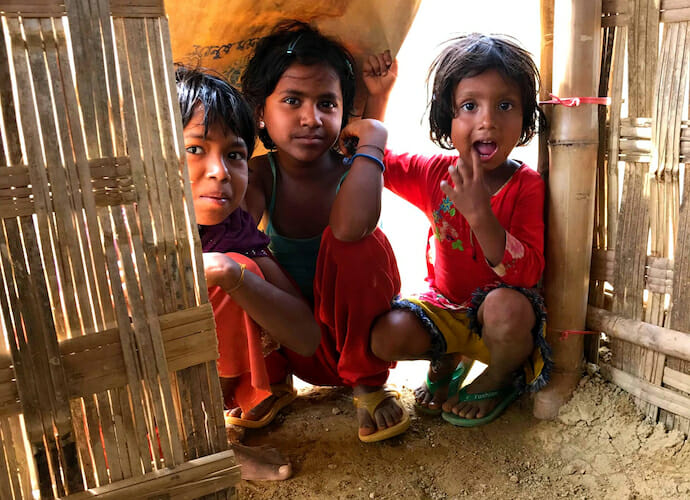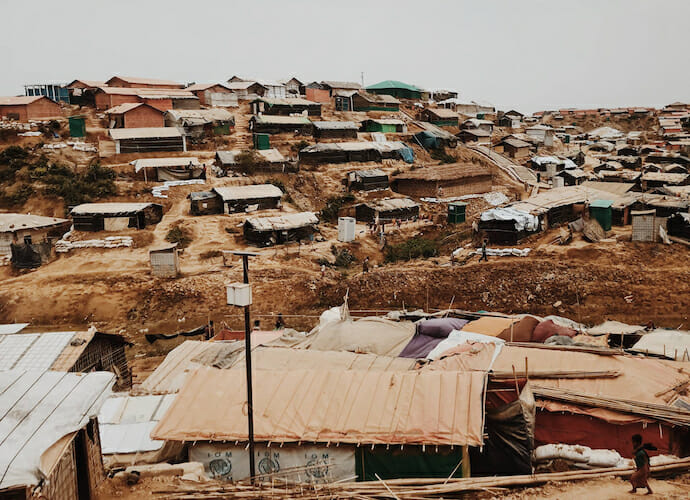The Platform
Latest Articles
by Kanan Heydarov
by Khalid Cherkaoui Semmouni
by Rasel Hossen Shakib
by Gordon Feller
by Collins Chong Yew Keat
by James Carlini
by Pitamber Kaushik
by Theo Casablanca
by Ikram Ali
by Eva Kneifel
by Kanan Heydarov
by Khalid Cherkaoui Semmouni
by Rasel Hossen Shakib
by Gordon Feller
by Collins Chong Yew Keat
by James Carlini
by Pitamber Kaushik
by Theo Casablanca
by Ikram Ali
by Eva Kneifel
Building a Home Amid a Pandemic: A Look at Humanitarian Shelter Solutions Across Borders
While wealthier countries can afford social distancing to ward off COVID-19, refugee communities and camps are uniquely vulnerable to health and safety threats.
COVID-19 continues to claim its victims, both human and economic, at an alarming pace. No one is sure how long social distancing guidelines will be enforced, what the effects of re-opening in some states and nations will be, or how well prepared our world is for the second wave due to come this fall. However, one thing seems certain: a deep and painful economic recession and an ever-increasing death toll await both the United States and the rest of the global community.
Moreover, the pains of the pandemic continue to affect the most vulnerable disproportionately. Most notably, those who do not have the privilege to practice social distancing measures or have access to the proper medical care that offers the opportunity for those populations to overcome the negative consequences of the unmitigated spread of COVID-19. Refugee communities and camps–already uniquely vulnerable to health and safety threats–are among the most at-risk of these populations.
There are over 70 million refugees worldwide and the number is growing at a record pace; 30 million of which are housed in refugee camps, where families live on average between 12 and 17 years. These communities, where people are living off of inadequate aid solutions and in dense populations, make for heartbreakingly easy targets for COVID-19.

Last week, I spoke to Julia Wallin, the Co-Founder and COO of Every Shelter, a nonprofit whose mission is to improve shelter conditions for displaced persons worldwide. From their headquarters in Houston, the organization works with national and international NGO partners to provide sustainable, affordable, and innovative shelter solutions for displaced persons across the world, from Lebanon to Turkey to Mexico. Their current products include “Emergency Floor,” a modular, lightweight flooring solution that keeps families warm and dry and is easily sanitized, and “Every Billboard,” shelter coverings made from upcycled billboard waste.
The current crisis has made “Every Billboard” an even more notable product. Besides cutting down on the 800 million square feet of billboard waste currently sitting in United States landfills, the tarps are a durable and cost-effective solution — exactly what these camps need, especially in the midst of a pandemic and pending economic crash. The idea to upcycle discarded billboards came from one of the team’s trips to Lebanon.
“We noticed that there were some refugees using discarded billboards as shelters…we started looking for a way to upstream this textile and provide it with new life, while providing a cost-effective alternative to the humanitarian aid industry,” Wallin told me in our interview. The tarps that are most widely distributed by aid organizations are inadequate and usually fail within 3-6 months. Every Shelter’s billboard solution could improve its durability by 4-8 times. As for the most impressive part of this innovation: it does not have any competitors on the market that are upcycling a massive single-use plastic waste stream and turning it into something life-saving. Both “Every Billboard” and “Emergency Floor” are unique products that offer sustainable, mobile, sanitizable, and dignified shelter solutions for displaced persons.
“We came up with this process where we cut the billboard into twelve-inch strips and reweld [them] together…repurposing it and giving it more color and life which can be really impactful in refugee camps because everything is so tan and blue,” Wallin explained. The process also protects the intellectual property of brands.

Despite the seeming greater necessity of Every Shelter’s designs amidst the COVID-19 crisis, they are facing the same setbacks and obstacles as corporations and nonprofits around the globe. They have been forced to streamline operations, halt some external contracts, and shift their focus from in-progress projects to raising awareness about how their products can assist in COVID-19 mitigation. However, it isn’t all bad news. Wallin hopes that the nature of the international emergency will fuel greater interest and funding into research and the creation of human-centered and economic innovations that provide answers to the problems that have endured for decades. One example is the production of a medical-grade flooring system, which would be an immense breakthrough for humanitarian aid efforts in refugee communities.
Wallin concludes with an apt comment on our recognizing privilege amid the pandemic: “[Displaced people] don’t have the privilege to socially isolate and distance in these situations…[they] are acutely vulnerable. It is a pure privilege to be able to be social distancing.”
In the United States, there is growing malcontent from political factions that mistake security for oppression. This error will do nothing but increase the number of cases and fatalities while leaving our essential workers and hospitals overburdened and in danger. Citizens of developed, peacetime nations must recognize their privilege and slow the spread, if not for themselves, then for the refugees and at-risk populations who will undoubtedly suffer the most.
“I think it’s important to recognize that aid itself is supposed to be apolitical…if there is a population in need, it will show up to support them…but is all interconnected to [political economies], and figuring out how we can support these human needs is important,” finishes Wallin. Despite the shutdowns, border lockdowns, and political pushback, Every Shelter continues to propel positive change for refugees and immigrants. Americans must take a page from their book and do what we can within our own communities to support each other and every effort to ease the negative impacts of COVID-19. We have the chance to be on the right side of history with our actions during this time. Take it.
Special thanks to Julia Wallins.
Although originally from southeastern Virginia, Tessa DeConcini attended high school in Tucson, Arizona, and is now a freshman at Arizona State University studying Global Studies, Spanish, and French. Tessa has extensive political and community service experience. Tessa plans to pursue an education and career in foreign service and international law.
